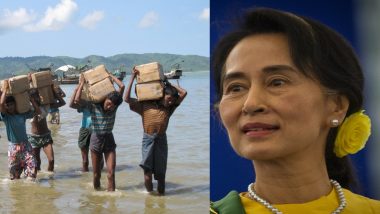Washington, Mar 8: The US Holocaust Memorial Museum has said it was stripping Myanmar's de facto leader Aung San Suu Kyi of a prestigious human rights award, accusing her of doing little to halt the ethnic cleansing of Rohingya Muslims.
Suu Kyi, who won the Nobel Peace Prize in 1991 for her long campaign against the country's military dictatorship, was awarded the Holocaust Museum's Elie Wiesel award six years ago "for her courageous leadership and great personal sacrifice in resisting tyranny and advancing the freedom and dignity of the Burmese people."
But the Museum said it was rescinding the award due to her inaction over what it called "mounting evidence of genocide" committed by the Myanmar military against civilians from the Rohingya minority.
"As the military's attacks against the Rohingya unfolded in 2016 and 2017, we had hoped that you -- as someone we and many others have celebrated for your commitment to human dignity and universal human rights -- would have done something to condemn and stop the military's brutal campaign and to express solidarity with the targeted Rohingya population," the museum said in a letter to Suu Kyi.
Instead, it said, her political party, the National League for Democracy, has refused to cooperate with UN investigators and added to the anti-Rohingya rhetoric.
The party has also obstructed journalists trying to report on the mass murder and expulsion to Bangladesh of the Rohingya. Two Reuters journalists who reported extensively on the Myanmar military's involvement in the campaign against Rohingyas have been arrested.
"The military's orchestration of the crimes against Rohingya and the severity of the atrocities in recent months demand that you use your moral authority to address this situation," they said.
In November a joint report by the Museum and Southeast Asia-based watchdog Fortify Rights -- based on testimony they gathered in the field -- documented "widespread and systematic attacks" on Rohingya civilians.
The United Nations has repeatedly called for a stop to the violence and termed the forced migration of the Rohingyas from their home state of Rakhine in Myanmar as the 'world's fastest growing refugee crisis.' The United Nations has also described the military offensive in Rakhine, which provoked the exodus, as a "textbook example of ethnic cleansing". Myanmar's military says it is fighting Rohingya militants and denies targeting civilians.
The Rohingya have faced decades of discrimination and repression under successive Burmese governments. Effectively denied citizenship under the 1982 Citizenship Law, they are one of the largest stateless populations in the world.
New reports suggest that a staggering 700,000 people have fled from Rakhine to neighbouring Bangladesh since August 2017. Testimonies of refugees arriving in Bangladesh reveal a systemic campaign of terror, abuse, rape and forced starvation to drive out the Rohingyas from their villages.
The award was named after Elie Wiesel, a survivor of the Nazi genocide against Jews who spent much of his life campaigning for human rights, himself winning the Nobel Peace Prize in 1986.
Suu Kyi, Myanmar's symbol of democracy for decades, has come under heavy criticism for her refusal to stand up for the Rohingya people.
In January US diplomat Bill Richardson resigned from a Suu Kyi-appointed panel set up to ease tensions with the Rohingya, assailing her for an "absence of moral leadership."
In Geneva on Wednesday the UN human rights chief Zeid Ra'ad Al Hussein called for a new body tasked with preparing criminal indictments over the Myanmar atrocities.
(The above story first appeared on LatestLY on Mar 08, 2018 07:38 AM IST. For more news and updates on politics, world, sports, entertainment and lifestyle, log on to our website latestly.com).












 Quickly
Quickly


